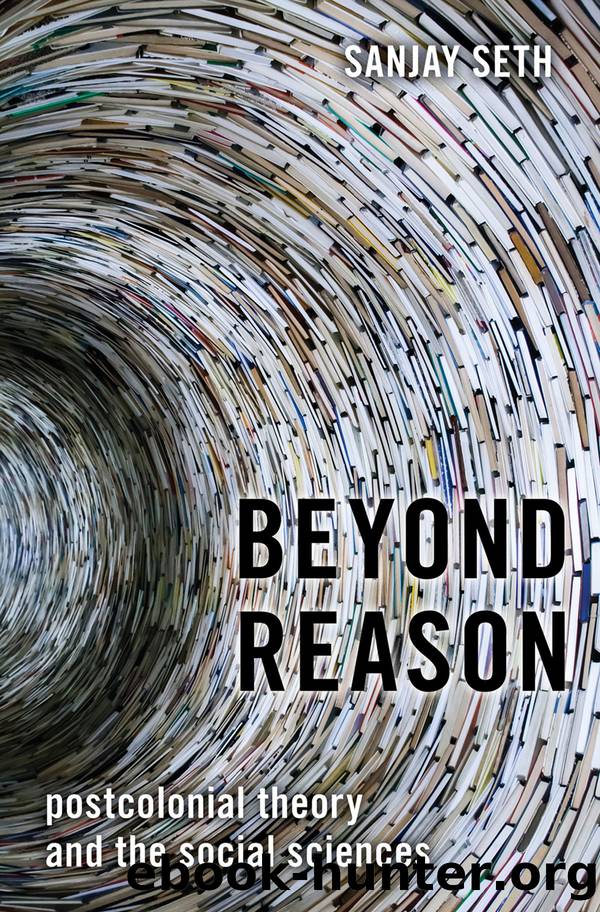Beyond Reason by Seth Sanjay;

Author:Seth, Sanjay;
Language: eng
Format: epub
Publisher: Oxford University Press, Incorporated
Published: 2021-06-15T00:00:00+00:00
The Politics of the Code of History
Many will object that to argue thus is to open the floodgates to Holocaust deniers, nationalist mythmakers, and other abusers of history. Unless we accord epistemic authority to history writing, how can we make the necessary distinctions between an objective recounting of the past and mythical distortions and abuses of it? The accusations of âpostmodern relativism,â âirrationalism,â and the like, often leveled at those who call the epistemological certitudes of the discipline into question, are a sign that some of our deepest convictions are informed by, even anchored in, historical accounts; and thus that any questioning of the epistemological privilege accorded the discipline threatens to untether these convictions.
Those who make this objection wittingly or unwittingly draw our attention to the fact that the status we accord historyâhow we understand it and how we practice itâis not simply an epistemological question, but a pressing political question, in a manner that is not true of all disciplines. While politicians and members of the public may have strong opinions on, say, whether stem-cell research should be conducted and what uses it can legitimately be put to, it isâwith exceptionsârare for nonscientists to have strong opinions on the âscienceâ itself. In part because history is not highly technical and thus continues to be written in ordinary language, it is by contrast something on which nonhistorians have opinions, and how the past is to be recounted is sometimes a matter for public debate and disputation. The discipline of history thus exists on two levels or operates through two registers. It has a âcloisteredâ life, one lived through journals, reviews, specialized conferences, university departments, professional associations, and so on, which may and sometimes does include vigorous contestation, but within the terms of the code of history, and subject to its protocols. It also has a public life, where what happened in the past and how that is to be understood can sometimes be the subject of heated political contestation, not always within the terms of the code or conforming to its protocols.67
The form of relation between these two registers varies. In its public life in Western Europe and North America, history writing contends with other forms of historicity, including novels, plays, films, and other mediatized forms of representing the past. But because the code of history has accrued considerable prestige in the two centuries or more of its existence, the coexistence of these forms of historicity with the code of history does not, usually, lead to conflict. Certain distinctions have become widely accepted, allowing different forms of historicity to exist in their separate domains. The most significant and sweeping of these is the distinction between fact and fiction, which usually maps onto the distinction between truth and entertainment, between the âfoundâ and the âinvented/created.â Works that deal with the past but do not aspire to being âhistory properâ are deemed to be, and usually deem themselves to be, fiction or entertainment, in contradistinction to history. That this âdeemingâ happens institutionally
Download
This site does not store any files on its server. We only index and link to content provided by other sites. Please contact the content providers to delete copyright contents if any and email us, we'll remove relevant links or contents immediately.
Cecilia; Or, Memoirs of an Heiress — Volume 1 by Fanny Burney(32527)
Cecilia; Or, Memoirs of an Heiress — Volume 2 by Fanny Burney(31928)
Cecilia; Or, Memoirs of an Heiress — Volume 3 by Fanny Burney(31915)
The Great Music City by Andrea Baker(31898)
We're Going to Need More Wine by Gabrielle Union(19020)
All the Missing Girls by Megan Miranda(15888)
Pimp by Iceberg Slim(14464)
Bombshells: Glamour Girls of a Lifetime by Sullivan Steve(14037)
For the Love of Europe by Rick Steves(13814)
Talking to Strangers by Malcolm Gladwell(13330)
Norse Mythology by Gaiman Neil(13314)
Fifty Shades Freed by E L James(13215)
Mindhunter: Inside the FBI's Elite Serial Crime Unit by John E. Douglas & Mark Olshaker(9289)
Crazy Rich Asians by Kevin Kwan(9261)
The Lost Art of Listening by Michael P. Nichols(7475)
Enlightenment Now: The Case for Reason, Science, Humanism, and Progress by Steven Pinker(7287)
The Four Agreements by Don Miguel Ruiz(6728)
Bad Blood by John Carreyrou(6599)
Weapons of Math Destruction by Cathy O'Neil(6248)
